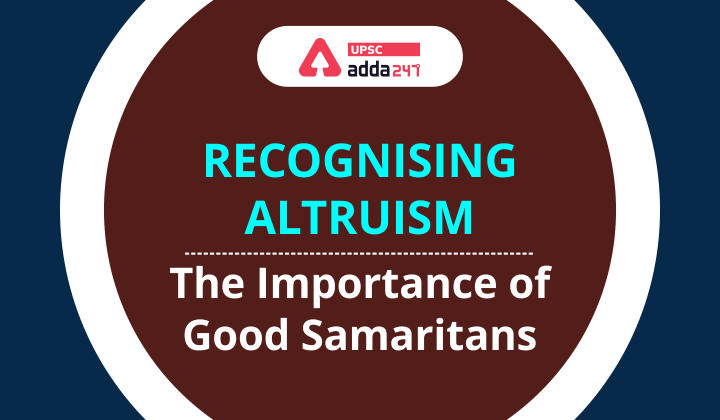Table of Contents
Recognizing Altruism- Relevance for UPSC Exam
- GS Paper 2: Governance, Administration and Challenges- Government policies and interventions for development in various sectors and issues arising out of their design and implementation.
Recognizing Altruism- Background
- Recently, the Ministry of Road Transport and Highways took an initiative to award Good Samaritans who save the lives of road accident victims with a cash prize.
- This is a welcome attempt to reduce India’s staggering annual death toll from mishaps.
Peace at the Heart of Education
Recognizing Altruism- Road Accidents in India
- Global comparison: India ranks third among 20 nations that have the highest number of accidents.
- India fares far worse on an important metric- cases to fatalities ratio- compared to the U.S. and Japan, which have more recorded crashes but fewer deaths.
- National Crime Records Bureau (NCRB) data: Even during COVID-19 led severely disrupted mobility period, 1,33,715 lives were lost in 1,20,716 cases attributed to negligence relating to road accidents.
Social and Emotional Learning- Empathy Through Education
Recognizing Altruism- Good Samaritan Laws in India
- Motor Vehicles law and Good Samaritans:
- Under it, a Good Samaritan voluntarily helps an accident victim with no expectation of payment or reward.
- Under the law, the good Samaritans have no legal obligation to record his involvement or aid the investigation in the case.
- Last year, a chapter was added in the Act through an amendment, to sensitize police forces and hospitals on good Samaritans.
- National Road Safety Board: Government recently notified National Road Safety Board.
- Mandate: to formulate standards on, among other things, safety and trauma management, to build capacity among traffic police, and put the crash investigation on a scientific footing.
- Associated Challenges: Even after the amendment last year in the Act, altruism is still affected by the perception of harassment and legal complications.
Bureaucracy’s Digital Challenge
Recognizing Altruism- Good Samaritan plan of the Road Transport Ministry
- About: It will reward socially-minded individuals who offer immediate assistance and rush a victim with certain kinds of injuries to the hospital, with ₹5,000 and a certificate of recognition for saving a life.
- Funding: State governments are responsible for the plan, with the Centre providing an initial grant, but the Union Transport Ministry will give its own award of ₹1 lakh each to the 10 best Good Samaritans in a year.
With a Bang- IMD’s Rainfall Forecasting Model
Way Forward
- Government should start with scientific road design and standards, and zero-tolerance enforcement for violations.
- Good Samaritan Plan: It should be implemented with the goal to reduce accidents and the ratio of deaths and injuries to cases.
- Eliminating the bureaucratic barriers: District Committees tasked with awarding good Samaritans should readily recognize their contribution, aided by the police, hospitals, and RTOs.
Conclusion
- Many more people will continue to be impelled by sheer altruism to help road users involved in a crash, and governments should get bureaucratic barriers out of their way.




 TSPSC Group 1 Question Paper 2024, Downl...
TSPSC Group 1 Question Paper 2024, Downl...
 TSPSC Group 1 Answer key 2024 Out, Downl...
TSPSC Group 1 Answer key 2024 Out, Downl...
 UPSC Prelims 2024 Question Paper, Downlo...
UPSC Prelims 2024 Question Paper, Downlo...
